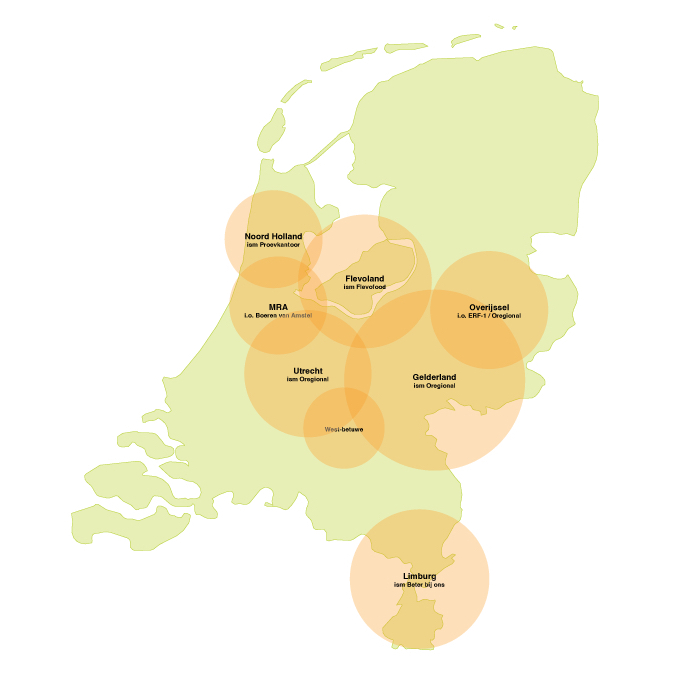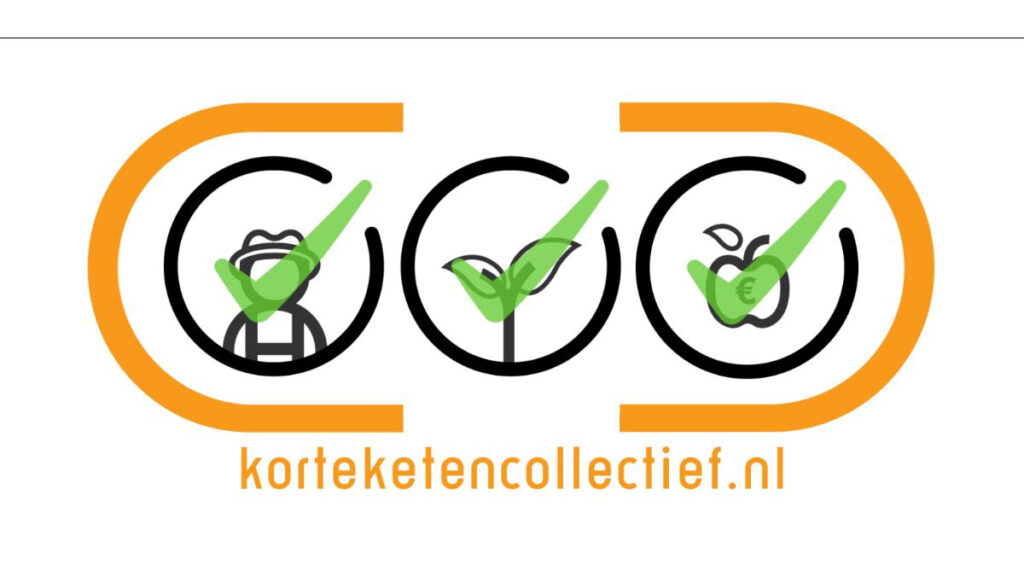Dutch Short Chain Collective
Frontrunners in the short food chain join forces in Dutch Short Chain Collective, to substantially increase sales of regional products
Local2Local, Coöperatie Oregional, Boeren van Amstel, ProeVkantoor and Vereniging Flevofood have taken the initiative to join forces. Under the name “Short Chain Collective Netherlands,” interregional cooperation is being established with the goal of increasing sales of regional products, and realizing new revenue models while maintaining short chain principles. The cooperation makes it possible to increase security of supply and diversity of products and customer groups. This creates important economies of scale that strengthen the development of robust short food chains and create new sales opportunities. These short chain parties have united in the Dutch Short Chain Collective.

The collaboration explicitly responds to the increasing demand for tasty, healthy and sustainably produced local food. In order to meet this demand, it is necessary to take the next step in growth that requires cooperation beyond the capabilities of individual organizations. In particular, this involves developing and sharing knowledge and experience around market information, logistics, digitization and data-driven business processes.
In recent years, Local2Local has been connecting with leaders in the short food chain to work together to market regional products to nationwide buyers. Mark Frederiks of Local2Local: “There is almost no direct relationship between citizens and farmers anymore. Regional short food chain parties are working on this connection with a sustainable perspective for farmers and new earning models. The chain partners are already doing this separately in their own region by supplying directly to companies, (company) restaurants, catering, supermarkets, and government, educational and healthcare institutions. For these parties, diversity, security of supply and food safety are crucial. To ensure this even better, we are therefore pulling together with combined logistics, a shared data platform and joint concept development. This will offer national parties access to an extensive local assortment and immediately create a foundation to serve a wider audience among individual consumers. This marks an important step in the development of robust regional food systems.”

The participating parties have been active in the short chain for an average of over 10 years and are leaders in the transition of our food system. The farmer collectives represent over 400 producers with thousands of products and hundreds of business customers are already connected. In addition to practical trade, knowledge is developed and networks are formed, from area-based cooperation. The parties thus see important developments coming together, which can be jointly taken up within area-oriented cooperation. A good example is the rollout of a robust, regional and regenerative food system in the Amsterdam Metropolitan Area.
In the development of knowledge, the collective is supported by the Stichting Voedsel Verbindt and the European projects EU4advice and FoodClic, among others. Issues in the field of data and digitalization will also be addressed in cooperation with the Data Value Center Agri & Food Korte Keten.
Gerard Titulaer of the cooperative Oregional: “Corona has shown us that food and health, urban development, climate change and food availability are inextricably linked. Our short chains now bring this together. By joining forces in the city and the region, knowledge and resources, we can propagate and capitalize on the added values of the farmer through new revenue models, among other things.”
Martin Topper, chairman of Vereniging Flevofood agrees: “With this cooperation, big steps can be taken and short chains can be given sufficient clout to increase their own market position and hold it for the long term. With joining forces, we can take back our own market.”
“We are building a sustainable food system, also affordable for future generations, by putting nature back in her power and offering customers solutions that contribute to this. In doing so, we kill three birds with one stone: ecological, economic and social values are at the top,” adds Michel Penterman of Farmers of Amstel.
“North Holland is the most diverse agricultural region in the Netherlands and offers a huge network of nature-inclusive growers and farmers. The mission of my company ProeVkantoor is to ensure that they are visible and their fresh produce reaches the end user directly without the intervention of wholesalers,” said Matthijs Post of ProeVkantoor.
Mark Frederiks: “All affiliated parties remain active in their own region. Each short chain retains its own identity and customers and remains in its strength. The collective strengthens what is already working and together they develop what is lacking. All this runs through existing partnerships, using Local2Local’s shared IT platform. We are now starting with five short chain parties and new networks are already ready to join as well.”
“After the outbreak of World War II, we transformed the Dutch export-oriented food system into a food network focused on local and regional marketing. Today’s challenges once again call for a radical change where our landscape and the farmer once again serve the community. This collaboration is capable of causing significant acceleration. From Fort bij ‘t Hemeltje in Houten, we are happy to reinforce this story and together build a safe environment, just as the Stelling van Amsterdam and the Hollandse Waterlinie were created in the past. By using the power of nature and working together we can do this.” – HRH Prince Carlos de Bourbon de Parme, Compazz Foundation.
Contacts
Correspondence and visiting address
Fortweg 9
3992 LX Houten
Gerard Titulaer, Area Cooperation Oregional: 06-22696467
Mark Frederiks, mark@amped.nl, Amped/Local2Local: 06-11375921
Information participating parties:
Cooperative Oregional is particularly active in Gelderland.
Farmers of Amstel is active in the Amsterdam region
ProeVkantoor is active in North Holland
Vereniging Flevofood is active in Flevoland and the MRA
Local2Local is active in the Utrecht region, West Betuwe, Flevoland and the MRA